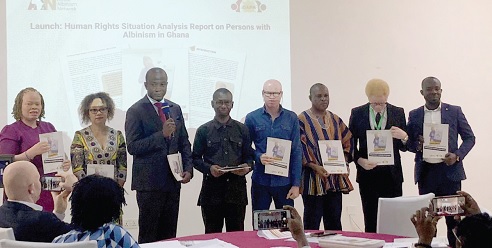The Africa Albinism Network (AAN) and the Ghana Association of Persons with Albinism (GAPA) have launched a report on the human rights situation of persons with albinism, with a call on government and stakeholders to intensify efforts to address stigma, discrimination and harmful practices against them.
The report, launched in Accra last Thursday, reviews Ghana’s regional and international human rights obligations, alongside national policies and frameworks to protect persons with albinism.
Developed from consultations across the 16 regions of the country, the report further highlights challenges such as limited access to healthcare, educational barriers and violence encountered by persons with albinism, while recommending policies to enhance the rights and inclusion in society of persons with albinism.
Challenges
The Deputy Executive Director of the Institute for Human Rights and Development in Africa, Michael Gyan Nyarko, said persons with albinism faced multiple challenges, including limited access to healthcare, the lack of educational support, discrimination and violence.
He explained that such people were at high risk of skin cancer due to the absence of melanin, while access to sunscreen and specialist care remained limited.
“At the time of our research, there were between 25 and 40 dermatologists in the country, serving over 30 million people.
For persons with albinism who require regular skin checks, this is a major gap,” Mr Gyan Nyarko said.
He said many children with albinism struggled in school due to visual impairments, with their condition often misunderstood.
Mr Gyan Nyarko said harmful myths and beliefs such as persons with albinism not dying or their body parts bringing wealth put them at risk of attacks, citing the 2017 killing of a woman with albinism, believed to be for ritual purposes, which had remained unresolved, and the attempted abduction of a 16-year-old boy at Garu while playing football, which was foiled by community members.
He added that the absence of national census data on persons with albinism had undermined effective planning for essential services and support.
“Without data, the government cannot plan effectively for services such as sunscreen, assistive devices or education support,” he said.
Commitment
Speaking on behalf of the Chief of Staff, the Deputy Technical Aide in charge of Finance and Administration at the Office of the President, Michael Sumaila, said the government was committed to addressing the challenges confronting persons with albinism.
He explained that measures were underway to amend the Disability Act to broaden its scope and ensure that persons with albinism were captured in national programmes.
Mr Sumaila added that access to education and healthcare remained a priority.
He said the government would work to make health insurance more accessible and responsive to the needs of persons with albinism, including services for skin care and visual impairment.
He also reaffirmed the government’s plan to strengthen inclusive education by providing tailored materials for students with albinism and other disabilities.
“We are going to work with the National Commission for Civic Education to increase public awareness of the rights of persons with albinism,” he said.
Action plan
The Executive Director of the Africa Albinism Network, Boniface Massah, urged Ghana to adopt a national action plan on albinism in accordance with the African Union framework.
He explained that such a plan would provide a clear basis for funding and implementing programmes by Parliament and ministries to address the specific needs of persons with albinism.
Mr Massah further called for the inclusion of persons with albinism in decision-making processes at all levels.
“We must have people with albinism in leadership positions to ensure visibility and effective representation,” he said.

